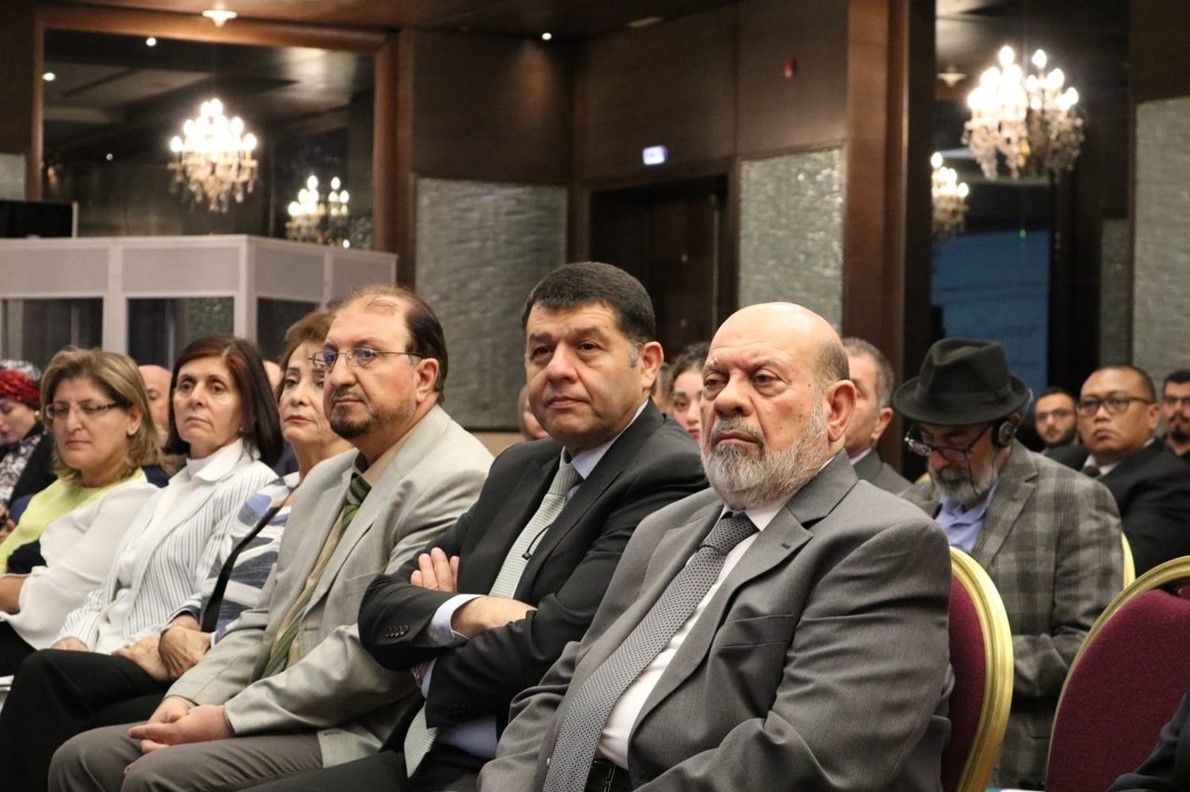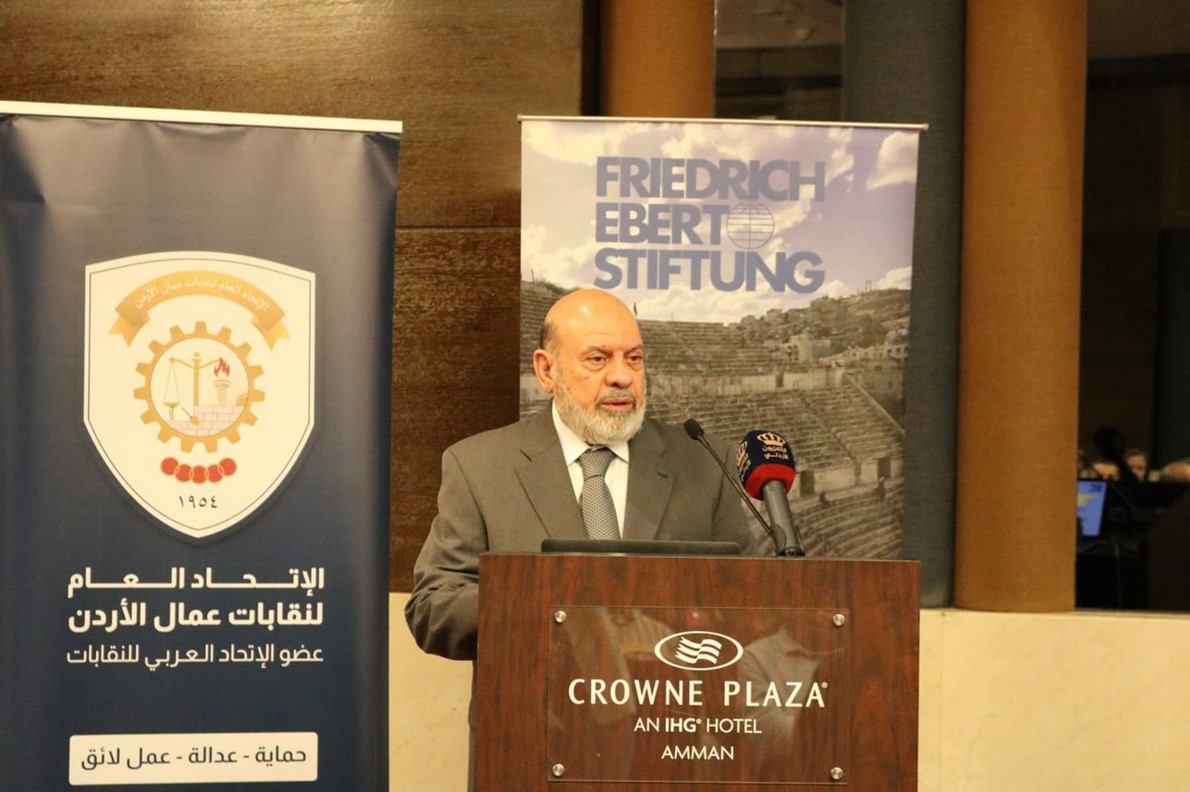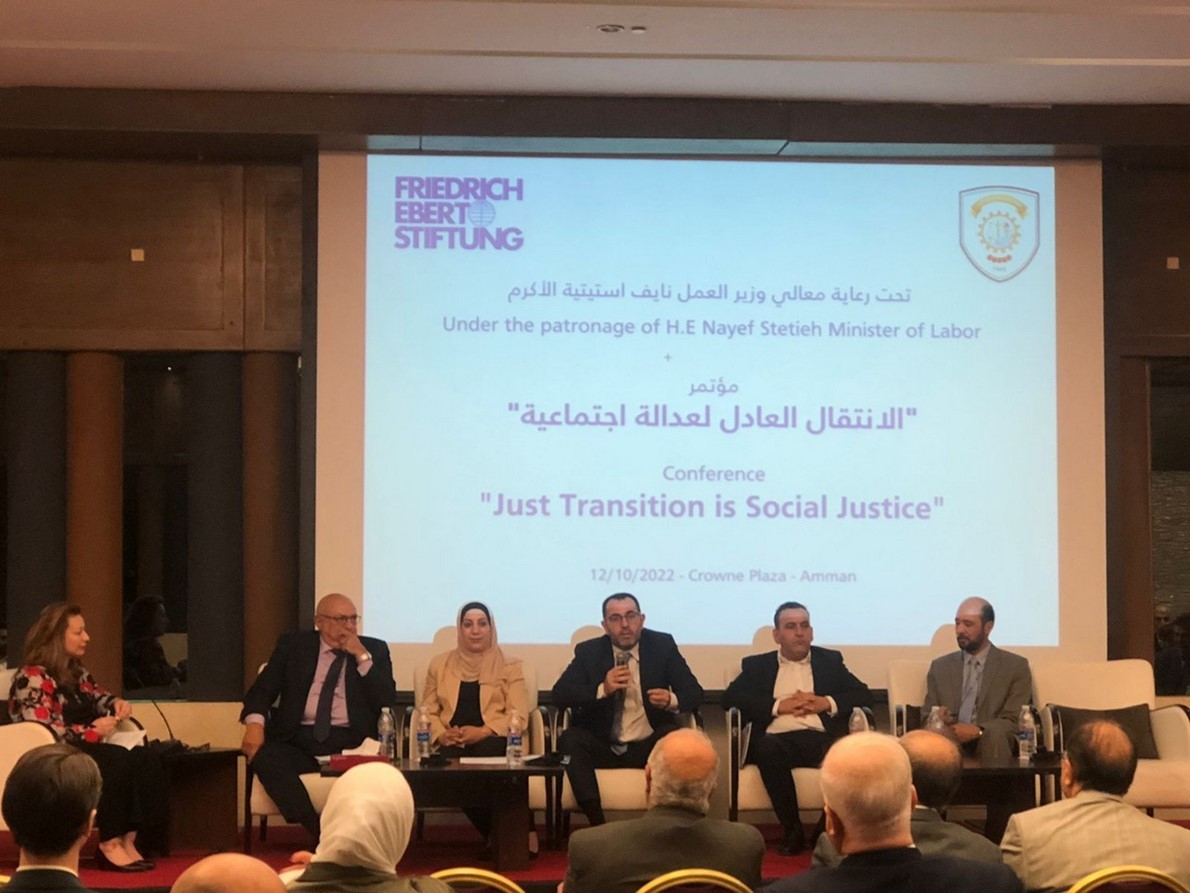Conference discusses mitigating disruptions in labor markets

On Wednesday, October 12th, 2022, an audience of approximately 100 participants attended the “Just Transition is Social Justice” conference held in the Al-Nabateen hall of the Crown Plaza Hotel, Amman. The focus was on the role of Just Transition, prioritising social justice and sustainability, in order to mitigate the socio-economic disruptions in labour markets that may result from a transformation to a green, zero-carbon economy.
Under the patronage of the Minister of Labour, H.E. Nayef Stetieh, organised and supported by the Friedrich Ebert Stiftung (FES) and the General Federation of Jordanian Trade Unions, this conference provided the space for open discussion, raised thought provoking questions, and allowed for a dynamic exchange of ideas among panellists and participants. The presentation of the novel report on this topic by Dr. Bashar Mahmood Zeitoon, titled “A Just Transition in Jordan – The Role of Trade Unions”, provided the basis for this conference and catalysed two discussion sessions.
With welcoming notes by Dr. Magdalena Kirchner, Resident Director of FES Jordan, as well as Mazin Almaaytah, of the General Federation of Jordanian Trade Unions, and H.E. Mr. Nayef Stetieh, the Minister of Labor, the conference was opened. Setting this conference into the context of the upcoming Climate Change Conference (COP27), Dr. Magdalena Kirchner expressed the dedication of FES to continuously act as ally to trade unions and labour rights activists while supporting regional and international cooperation among unions for social justice. To ensure a Just Transition, unions cannot take a passive role but need to be at the frontline of change and in finding win-win solutions, stressed Dr. Kirchner while emphasising the relevance of supporting vulnerable groups such as youth and women in light of current challenging times, and in particular regarding the future for climate and labour rights. Common themes among the opening remarks where the extraordinary importance of these topics for the Arab world, the necessity for joint approaches by public and private sector, as well as the necessity of adapting to a new reality.
The first session was initiated by the author of the report himself, Dr. Bashar Zeitoon, presenting his findings in a 15-minute, thought-provoking presentation. In his two-part presentation Zeitoon first focused on a brief summary of his paper and secondly expanded through a descriptive case study. Despite uncertainties in meeting benchmarks to reduce emissions, as well as high expected investments for governments and society, Dr. Zeitoon remained confident of positive change. He acknowledged the inevitability of socio-economic consequences that will affect the labour market, yet also sees the chance for new opportunities. He also expressed the necessity of social protection and financial support of those that are most negatively affected by such transitions. In his view, ensuring decent and safe working environments should be at the centre of cooperation between trade unions, ministries and society and enshrined into binding policies for the government. In the ensuing case study on Jordanian oil refineries, Zeitoon posed the dilemma of the future of oil and gasoline in light of a global shift within the market of electric transportation, shining light on the relevance of governmental incentivisation in evoking change. Encouraging continued research in this field, Dr. Zeitoon left the audience with questions on how the Jordanian government and workers will adapt to such transitions.
Next, the floor was opened for the five speakers of the first discussion-session, H. E. Zaid Al-Atoum, Mr. Bilal Shqarin, Dr. Metri Mdanat, H.E Dr. Yusuf Mansur and Mrs. Bushra Al-Salman.
Providing their perspectives on Just Transition from a Jordan-centric perspective they engaged with topical questions, provided by Moderator Dina Kisbi, Regional Program Manager Regional Climate and Energy Project MENA at FES. Member of Parliament, H. E. Zaid Al-Atoum, was first to take the floor and explain the holistic approach taken by the parliament in this regard. He sees Jordan at the forefront of transition to renewable energies in the Arab region, in particular with its commitment to reducing greenhouse gas emissions by 31 percent in the coming decade, as agreed upon at the COP26 last year. In terms of legislative obligations, priorities should lie on amending internal regulations and building capacity of parliamentarism to compose a more efficient committee, specific to environment and climate change, declared Al-Atoum. Al-Atoum emphasised balancing the budget and streamlining strategies on climate justice, to accompany progressive change in the process of Just Transition.
Mrs Bushra Al-Salman, Head of the General Union of Food Industry Employees, further gave an insightful contribution to the importance of fair transition to general unions. Voicing her appreciation of the inclusion of trade unions to discussions and developments on Just Transition, Mrs Al-Salman emphasised the risks of changes and developments to the labour market and workers. She therefore expressed her hope of trade unions being included in future committees working against climate change and for a Just Transition. Her priorities are acknowledging the diversity and vulnerability of the labour market, the relevance of improved social protection systems, as well as networking of trade unions and international organisations to develop a common approach.
The second session of the conference went beyond the context of Jordan and brought in local, regional, and international views of Just Transition. With a contribution by Fakhri Al Ajarmeh, Head of General Trade Union of Workers in Electricity, thoughts concerning the impact of transition on workers were reiterated. In his eyes, neither workers nor infrastructure in Jordan are currently prepared to adopt a new system. It is the role of not just unions, so Al Ajarmeh, to create partnerships and facilitate such transition. Al Ajarmeh therefore called for a joint effort on integrating goals of counteracting climate change in collective agreements. The Regional Programme Manager in Embassy of Sweden in Amman, Mr. Hamza Bani Yasin, reiterated this message by clarifying that adaptation should take priority to mere mitigation. Acknowledging the privileged position of Jordan in energy transition, due to its limited engagement in the fossil industry, he identified the three main issues facing the region presently: First, multi-dimensional poverty, second, human rights violations, and third, social security and safety. Mr Bani Yasin thus raised the need for focusing on social justice in climate change and transition, in particular considering those living in poverty. For this to come to fulfilment, certain gaps between the public and private sector must be bridged, stressed Bani Yasin.
Providing a point of view from the International Labour Organization (ILO), Mrs. Frida Khan, ILO Country Coordinator Jordan and Gender Specialist Arab States, closed the second discussion session. Clarifying the term of Just Transition as pertaining to the shift from environmentally degrading to environmentally responsible development, Mrs. Khan emphasised the relevance of focusing on protection of workers’ rights, while still meeting employers’ requirements within a shift to a green and fair economy. She continued, that using International Labour Conventions as the basis for Just Transition is essential to set minimum benchmarks required for equal, egalitarian, and productive labour.
Three main principles can be identified as having particular importance to the panellists and participants of this conference, in particular pertaining to the context of Jordan and the Arab region. Seen as detrimental to the facilitation of a Just Transition are skills development in lifelong learning and adaptation, social protection of those most vulnerable, and comprehensive cooperation of trade unions, civil society and governmental ministries. With a shared goal of speakers and audience, healthy optimism and a desire to act, the conference of “Just Transition is Social Justice” came to a close.















































